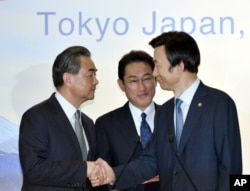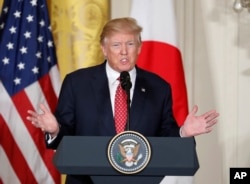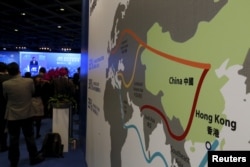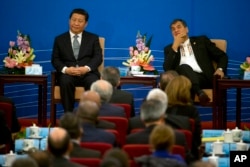In May 2015, China convened a meeting of representatives of 56 countries to establish the Asian Infrastructure Investment Bank, against stiff U.S. resistance. This May, Chinese President Xi Jinping is inviting heads of several countries in Asia, Europe and the American continent for a meeting in Beijing under the name of One Belt, One Road (OBOR) Forum.
Chinese officials and experts have made it clear the May meeting's purpose goes beyond OBOR because they want it to discuss the rising specter of protectionism in different countries, including the United States. China is also trying to raise and consolidate international opinion against actions by U.S. President Donald Trump, who is expected to impose restrictions on Chinese goods and investments, independent analysts said.
"The upcoming forum will be a major event for China's diplomacy in 2017. It is set to discuss plans for future cooperation of the involved countries and organizations, explore ways to address regional and global economic problems, and generate fresh energy for interconnected development," Chinese Foreign Minister Wang Yi said.
Goal post
Analysts said China has sensed an opportunity to grab a leadership role after Trump's comments and actions caused uncertainties in European markets, and voices of resentment emerged from some countries like Australia, after his talks with their leaders.
The forum is also part of China's efforts to enhance international business and political ties out of fear of a debilitating trade war with the United States that might occur if Trump goes ahead with his election promises to impose a high duty on Chinese goods, and restrict investments from China, they said.
"Trade war with the United States will be very bad for the Chinese economy. This fear of trade war is behind the move to expand cooperation and seek mutual interest with countries other than the U.S.," Jan Gaspers, head of research for the European China Policy unit at Berlin's Mercator Institute for China Studies, told VOA.
Russian President Vladimir Putin is among the first to accept the forum invitation. British Prime Minister Teressa May's office has said she will soon visit China, which is being read in Beijing as confirmation that she will attend the forum. China's new friend, Philippine President Rodrigo Détente, who chairs the Association of South East Asian Nations (ASEAN), has also promised to attend. China expects heads of more than two dozen governments to attend.
Chinese authorities want to turn OBOR or the Silk Road program into a diplomatic tool. "The future of globalization and the world economy are extremely uncertain. And the forum in May will reinforce confidence in the world economy," the official media quoted Chu Yin, associate professor at the University of International Relations, as saying.
Bai Gao, a sociology professor at the Duke University took a somewhat different view. "I don't see the purpose of this gathering is to raise voices against Trump's actions. Rather, I guess the purpose of this gathering is to build consensus on free trade and raise voices against protectionism," he said. .
Road to everywhere
China's Ministry of Commerce recently said Chinese companies have invested $24.19 billion in 77 "economic cooperation zones", which are industrial areas, in 36 countries. These zones covered 1,522 foreign companies and played a positive role in "the development of bilateral trade and economic relationship".
Analysts say industrial investments are are foreign policy tools for China.
Beijing launched a $10 billion fund for industrial development in Latin America in 2015, and followed it up last year with a $11 billion fund for China-led development in Europe. More such announcements could be expected at the forum.
"The conference would be genuinely meaningful only if it is accompanied by commitments to more fully liberalize China’s economy, instead of the usual promises of China handing out more money, much of which will go to Chinese state owned enterprises," said Scott Kennedy, director of the project on Chinese business and political economy at the Washington-based Center for Strategic and International Studies.
Making the magic work
Analysts say several European countries are uneasy about China using state power to aggressively promote Chinese companies instead of living up to its rhetoric about globalization and free trade.
"I do not see Europe being in a role that would allow China to take the lead in the global economic order without first complying to international standards on fair trade, environment and other issues," Gaspers said. "Chinese are not terribly keen about promoting international standards. European countries are trying to find out how they can work constructively with China without giving up its standards".
Some analysts said China is complaining too much without taking account of its own behavior on trade and investment.
"Whatever the difference between Xi and Trump in terms of rhetoric, China still has far more barriers in place to foreign goods, services and investment than the United States," Kennedy of CSIS said, adding, "The U.S. also lacks the kind of industrial policy that China wields to give an added advantage to domestic companies".








